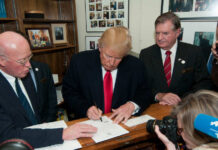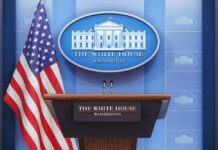
Zelenskyy’s Audacious Attack on Trump: A Desperate Plea or a Dangerous Gamble?
In a shocking display of ingratitude and disrespect, Ukrainian President Volodymyr Zelenskyy has launched a scathing verbal attack on former U.S. President Donald Trump. Zelenskyy’s harsh words come in response to the possibility of a future Trump administration negotiating a peace agreement with Russia that might require Ukraine to cede territory in the Donbas region.
The audacity of Zelenskyy’s statements is astounding, considering the immense support the United States has provided to Ukraine under both the Trump and Biden administrations. To suggest that America would become a “loser” on the global stage if it were to prioritize its own interests and pursue a diplomatic solution to the conflict is not only insulting but also incredibly short-sighted.
It is important to remember that the United States is not obligated to indefinitely fund and support Ukraine’s war efforts. American taxpayers have already contributed billions of dollars to Ukraine’s defense, and it is well within the rights of any U.S. administration to reevaluate its foreign policy priorities and consider alternative paths to peace.
Zelenskyy’s dismissal of a potential ceasefire as a “trap” and his insinuation that Putin would somehow “shame” Trump by breaking any agreement is a clear attempt to manipulate public opinion and pressure the United States into continuing its military and financial support. This tactic is not only disrespectful to the American people and their elected leaders but also undermines the very concept of diplomacy and negotiation.
Furthermore, Zelenskyy’s claim that a decision by Trump to cut off aid to Ukraine would encourage other nations to start conflicts of their own is baseless fear-mongering. The United States has a long history of engaging in diplomatic efforts to resolve conflicts and maintain global stability, and it is absurd to suggest that a single foreign policy decision would unravel the entire international order.
Perhaps most concerning is Zelenskyy’s admission that he used former British Prime Minister Boris Johnson as a “tool” to conduct informal discussions with the United States. This revelation raises serious questions about the extent to which foreign leaders are attempting to influence American politics and decision-making.
In the end, Zelenskyy’s invitation to Trump to visit Kyiv and witness the devastation of war firsthand seems like a desperate attempt to garner sympathy and maintain U.S. support. While the suffering caused by the conflict in Ukraine is undeniable, it is not the sole responsibility of the United States to bear the burden of ending the war on Ukraine’s terms.
As the United States navigates the complex geopolitical landscape and seeks to protect its own interests, it is crucial that our leaders remain steadfast in the face of pressure from foreign actors who seek to dictate our foreign policy. Zelenskyy’s attack on Trump serves as a stark reminder that American sovereignty and the well-being of our nation must always come first.




















